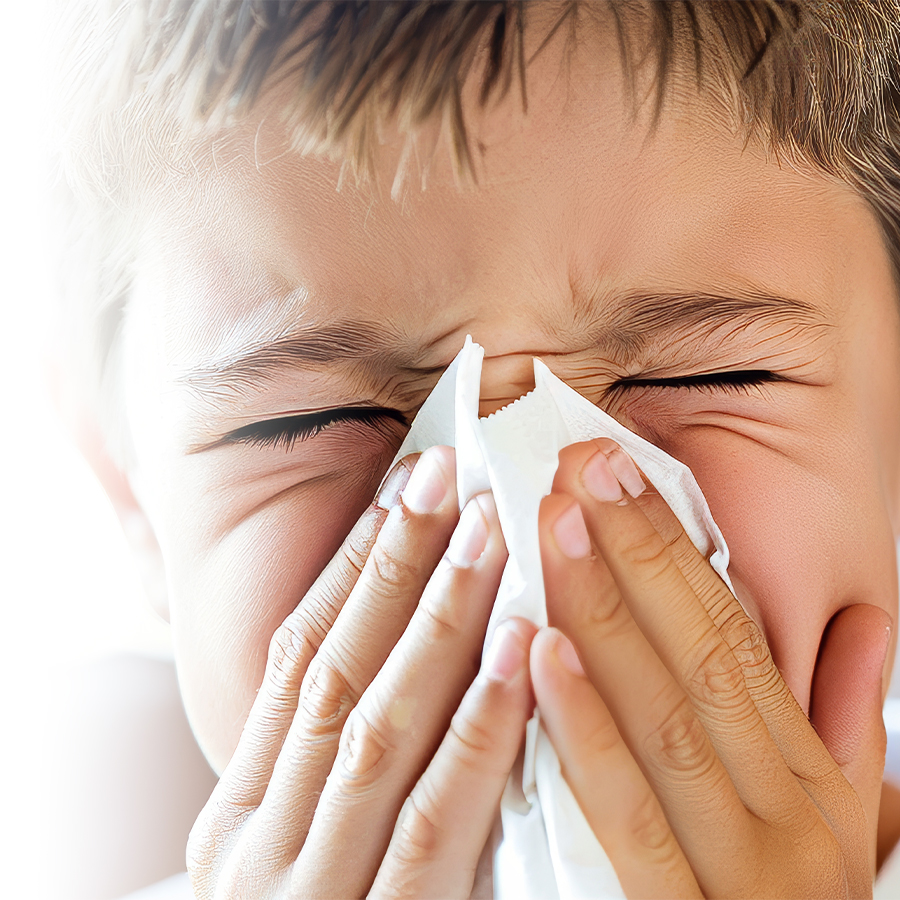Is your child looking forward to the warm weather to play outside? Don’t let seasonal allergies get in the way of outdoor activities!
Seasonal allergies: what are they about?
The number of people who have seasonal allergies has increased significantly in the past few decades, and young children are no exception! Seasonal allergies are a common reason for people to consult a pharmacist and ask for advice. They occur in response to air-borne allergens, such as pollen.
When your child comes into contact with this type of agent, the immune system defends itself by releasing very specific antibodies called immunoglobulin E (or IgE). These antibodies stimulate certain cells to release large amounts of a chemical called “histamine” into the bloodstream. It is the presence of histamine in the blood and its distribution to different parts of the body that causes typical symptoms of seasonal allergies.
Medications called antihistamines are usually used to counter its effects.
How do I know if my child has seasonal allergies?
Seasonal allergies occur at a specific time of year and vary from person to person, and sometimes even from year to year.
While some people are inconvenienced in the spring, others are affected in mid or late summer and even into the fall. In the spring, it is due to tree pollen, and in early summer, grass pollen is to blame. From late July to the first frost in the fall, ragweed is responsible for seasonal allergies.
If your little one suffers from seasonal allergies, they may be affected by the following symptoms:
- nasal congestion
- runny nose
- sneezing
- itchy eyes, nose, throat, roof of the mouth or ears
- watery eyes, and
- coughing
How can seasonal allergy symptoms be prevented?
For any type of allergy, the golden rule is to avoid the allergen at issue, which is pollen in the case of seasonal allergies. You may think this is easier said than done, especially when your child absolutely wants to play outside! Fortunately, there are a few tricks to minimize the impact of pollen exposure:
- Plan your child’s outdoor activities for late afternoon or evening. Pollen levels in the air are often higher in the morning.
- When it rains, pollen settles on the ground. Go for a walk shortly after a rainfall or even while it is raining; your little one can jump in puddles to their heart’s content!
- Change your child’s clothes as soon as they come into the house to prevent pollen from spreading inside your home.
- Have your child wash their hands after entering the house. If possible, have them take a shower or a bath to eliminate the pollen that may remain on the skin or hair.
- Keep the windows of the house closed, especially the one in your child’s bedroom.
What is the role of medication in childhood allergies?
Despite all your best efforts, you can't always prevent your child from coming into contact with pollen, especially if they want to roll around in the grass! In this case, you will find an ally in certain products sold at the pharmacy.
Saline-based solutions in particular can be very helpful in easing nasal congestion and secretions. For additional information about nasal hygiene, read the following fact sheet: Nose care: good habits to adopt. Moreover, certain medications, called antihistamines, are available in oral liquid form and can help ease allergy symptoms in young children.
As with any over-the-counter medication for children, it is recommended to always seek the advice of your pharmacist before purchasing an antihistamine. In addition to helping you make a suitable and informed choice, pharmacists will advise you about how to use the medication, what precautions to take, and what side effects it may have. Remember the importance of measuring the dose according to your child's age and weight.
In some cases, a doctor will be considered to prescribe certain treatments. An allergist is a doctor who specializes in allergies. Treatment options include pollen desensitization, also called immunotherapy. It consists of the repeated administration of a specific allergen under the skin to an allergic person. This type of treatment takes place over several years, usually three to five years, and can be considered for people five years and older. For more information on this topic, see the Pollen desensitization fact sheet.
The start of warm weather should be synonymous with joy and fun and not with sneezing and runny noses! Summertime should be a time to create happy memories with your family, so don't let allergy symptoms overshadow a perfect summer!
Speak to your pharmacist for additional information about seasonal allergies and their treatment. Pharmacists are available to parents and their little ones throughout the year!

